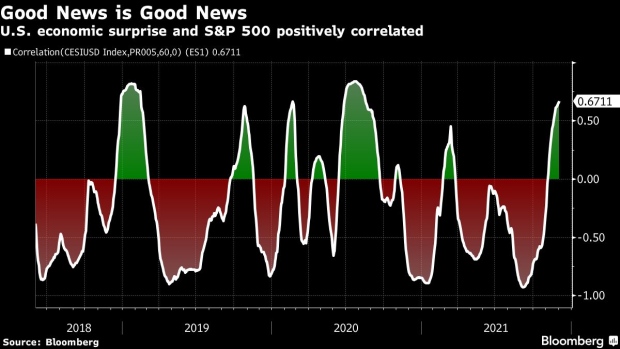Dec 3, 2021
Payrolls Miss Shows Bad News Is Still Good for the Stock Market
, Bloomberg News

(Bloomberg) -- A disappointing November payrolls report lifted equities futures in premarket trading, a reversal of a months-long trend in which investors traded on economic fundamentals rather than prospects for economic stimulus from the Federal Reserve.
The 60-day correlation between the S&P 500 e-mini futures and the Citi Economic Surprise Index, which compares actual data releases to market expectations, has been largely negative through the pandemic. That’s started to change over the last couple of months, with the relationship turning positive. Why? Inflation.
Consumer demand and a recovering labor market are no longer the key issue. Instead, the question is how much of corporate America can keep up with demand. Supply chain issues, surging commodity prices and emerging Coronavirus variants have pushed inflation to the highest in over a decade. It’s even prompted Fed Chair Jerome Powell to retire the word “transitory” from the lexicon, an acknowledgment that rising prices appear to be persistent and must be addressed. The Fed chair also put a faster pace of tapering the central bank’s bond purchases may be on the table.
The November payrolls report represents the first test of this pivot. Non-farm payrolls increased 210,000 last month. The consensus estimate was 550,000. The scale of the miss caught traders off guard, particularly since November is a historically strong month for the labor market. And what do you know, S&P 500 e-mini futures and two-year Treasury yields diverged. Perhaps bad news for the economy is still good news for the stock market, despite the Fed’s intentions.
©2021 Bloomberg L.P.


